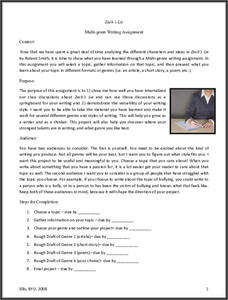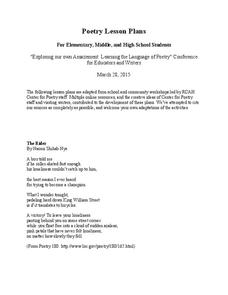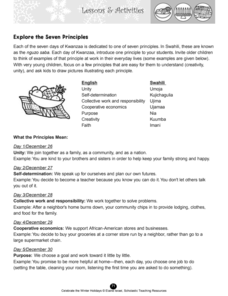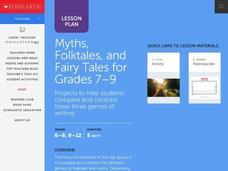Poetry4kids
How to Create Book Spine Poetry
Can you create a poem without writing a word! With found poetry, you can! Practice one version of found poetry with a lesson on book spine poems. Learners create poems by stacking books and reading the lines created by their spine titles.
Curated OER
Travel Scrapbook/Blog
Your young historians will design an ongoing travel scrapbook or blog as they learn about the major locations that have impacted the development of democracy in the world, including ancient Rome,...
Novelinks
Zach’s Lie: Multi-Genre Writing Assignment
How do people solve problems in healthy ways? Writers explore a topic of interest in their multi-genre writing assignment exploring Zach's Lie. The final resource in a series of seven includes multiple scaffolds and organizers for...
Curated OER
Lesson Learned: Creating a Life Reports Project
Tap into the wisdom and knowledge of older members of the community with this New York Times plan. To warm up, learners write about and discuss advice they have been given. After reading "The Life Report," an op-ed column that asks older...
American Museum of Natural History
Dress Up a Horse
Walk, trot, gallop! Young equestrians have an opportunity to learn all about horses with an engaging resource that lets them select tack to dress up a horse, create flip books that illustrate the various gates, have questions answered by...
Residential College in the Arts and Humanities
Poetry Lesson Plans
Need some ideas for poetry lessons? Check out this packet loaded with suggestions for elementary, middle, and high school writers.
The New York Times
Making Do: Learning and Growing Through Adversity
What is it that makes people keep going when they face challenges in life? Ask your class to consider this question in relation to their own experiences and as they read material from The New York Times. Using personal experiences...
Scholastic
Explore the Seven Principles
A lesson shines a spotlight on what makes Kwanzaa special by taking a close look at its seven principles. Gift ideas encourage scholars to make and give one to their family members. Class members celebrate heroes and role models of...
Scholastic
Myths, Folktales, & Fairy Tales for Grades 7-9
Here is a must-have resource for studying fairy tales, myths, and folktales with your class! It includes instructional ideas, activities, and materials to support a month-long review of these three unique genres of writing.
American Museum of Natural History
Make Your Own Mythic Mask or Puppet
No need to wait until Halloween to create a mask. Young anthropologists get involved in the centuries-old tradition of mask and puppet making with the help of an engaging resource that shows them how to craft their own masks or puppets.
American Museum of Natural History
Map Your Own World
Young archaeologists practice their mapping skills by creating a detailed site map of their room or another room in their home. After indicating walls, windows, doors, and closets, they add furniture and objects, labeling each item.
American Museum of Natural History
Solar System Scavenger Hunt
Scholars go on a hunt to locate objects that best fit the measurements to create an eye-catching scale model of the solar system.
Autism Fitness
Top 8 Exercises for Autism Fitness
Create an inclusive physical education program with help from eight exercises designed to met of the needs of children with autism. Activities include ball work, hurdles, bear crawls, resistance bands, star jumps, and the Scramble.
Scholastic
What’s the Good Word? Etymology Project Guidelines
Who named the shapes, or the days of the week? Should words be removed from the dictionary if they're no longer commonly used? Are there too many words in the English language? Language arts students explore these and additional...
American Museum of Natural History
Make Your Own Einstein Stationary
No need to be an Einstein for this project! Clever crafters add their name, address, and country to three Einstein-themed templates and create their own, personalized stationary. A great way to stay connected while social distancing.
American Museum of Natural History
Make Your Own Paper
Paper, paper everywhere. Paper is so prolific that few think about where the idea for it originated and how it is made. Introduce young readers to the paper-making process with an activity that lets them create their own.
American Museum of Natural History
Make a Terrarium
Scholars read a brief overview of what a terrarium is and how it creates the greenhouse effect, then click on a link to discover the materials and 10 steps they need to build their own.
Novelinks
Words by Heart: Level 3 Writing Assignment
Get in touch with the emotional side of writing by reading Words By Heart. The writing assignment helps learners make personal connections with the text and hone their writing skills by exploring a time that they had to forgive...
The New York Times
Crossing the Line Online: Sexual Harassment and Violence in the Age of Social Media - NYTimes.com
Sexual harassment and sexual violence are by no means new issues. What has changed is the role of social media in these issues. This powerful and troubling lesson uses a specific rape case to launch research into a discussion of the...
Shmoop
ELA.CCSS.ELA-Literacy.W.9-10.6
Make the move toward incorporating more technology in your classroom and help to prepare your class for the professional world. Here is a resource that describes the Common Core standard while incorporating technology and English...
Livaudais-Baker English Classroom
Literature Circles
Keeping readers focused during literature discussion circles can sometimes be a challenge. Check out this worksheet that ensures accountability by establishing six very specific, very different roles for group members: facilitator,...
Curated OER
Tell Me; I’ll Listen
Encourage respect, responsibility, and caring within your classroom with a collection of lessons that spark dialogue and self reflection. To address character traits, lessons touch on topics such as staying safe in the...
J. Paul Getty Trust
Tag: Whose Values
Get young people thinking about their lives and current topics of social justice, advocacy, gender, race, and identity. After examining several works by Barbara Kruger, participants select a tag with one of the questions printed on it,...
Curated OER
Hurricane Katrina: You Be the Reporter
Young scholars work in a small group to create news stories, feature stories and editorials/letters to the editor and organize them in a podcast, video-based program, or newspaper/magazine focused on Hurricane Katrina.























